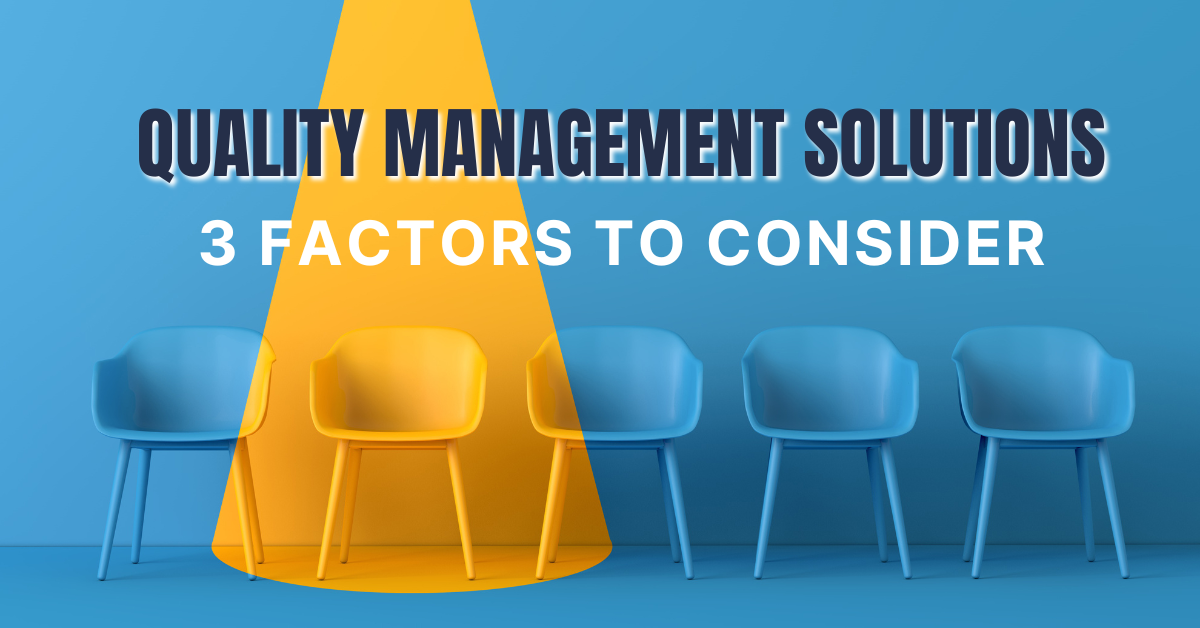Quality management solution is critical to the success of any business. It helps ensure compliance with industry regulations and standards, reduces costs, minimizes risks, and increases revenue. There are many different types of quality management solutions available in the market that can help you automate your quality management processes. So you can become more efficient while still maintaining compliance standards according to ISO 9001 guidelines.
To improve your quality management process and ensure ISO 9001 compliance, it’s important to consider some critical factors when choosing the right solution for your business. Working in a highly regulated environment often means that you have to maintain strict quality management procedures. At the same time, because you are running a business, you would have to consider various other factors too.
In this article, we will only be talking about factors that are measurable. This guide is built on the hypothesis that you would be doing your due diligence before finalizing your quality management solution vendor, i.e. checking their reputations, ratings, and reviews.
1. Scalable enterprise-level quality management solutions
At the time of getting a quality management solution vendor, keep a vision for at least 5 years and see if the solution is flexible enough to scale it to that length. Some of the questions you would want to ask are,
- Pricing – If your company or team grows by 10% YoY, what would be the additional recurring cost? Some quality management solutions keep their entry cost at a lower level but as you move along, it gets costlier. So you would want to know all the hidden costs/variable costs as you grow and scale. For e.g. at Isolocity as you increase the number of users, the solution actually gets more affordable. With 2 admin users, we charge $199/month but as you add one more admin user, the cost goes down to $184/month. As you keep adding admin users, the cost gets reduced and for 30 or more admin users, we charge only $117/month instead of $199/month. For 30 admin users, that’s a massive saving of almost $30,000 in a year.
- Integrations – As you grow, you would be using an increasing number of tools and therefore integrations become an important factor. You would want to choose a quality management solution that offers such integrations, which should ideally come with an open API too. At Isolocity, we integrate with a lot of tools and we also provide an open API.
2. Offerings and features should be the end of the story without any bias
- Offerings – You should not consider an electronic quality management solution if you are only looking for an online repository. The electronic quality management solution should come up with a good UI, have all the necessary modules of a standard QMS, should have a nice reporting mechanism, should help you automate all the tasks that involve labor. Unless you have experienced these elements, you would never know what you are missing. For e.g. instead of doing equipment maintenance manually, you can set up your equipment and add any applicable templates, and then on the due date, the owner will automatically have an action item in their database which opens an inspection.
- Bias – So at the time of choosing an electronic quality management solution, try and understand all the advanced level features they have which can be used by your organization and then don’t compare those features with your current process, rather compare those features with another electronic quality management solution without any bias (brand name bias, somebody I know from the company bias, etc).
3. Compliance and in-house expertise in quality management solutions
- Compliance – Compliance is another critical factor when choosing your quality management solution. You should know if the solution has been validated by any third party. For e.g. Isolocity is GMP-validated by a third party. You should also know if the software is compliant with CFR Part 11, SOC2, etc.
- In-house expertise – As you will be using the software on a daily basis, it is important the vendor has some in-house experts who can help you when needed. Ideally, your quality management solution vendor should have an in-house expert trained in compliance with quality and is aware of the standard being employed. For e.g. Isolocity has in-house GMP and ISO 9001 experts.
Conclusion
Along with all these factors, there might be some other elements specific to your organization or industry. For e.g, if the quality management solution provider has expertise in your industry or has clients similar to your company. But we think the above three factors are the most important and this should give you a direction towards the right course. If you need any help, feel free to reach out to us.




